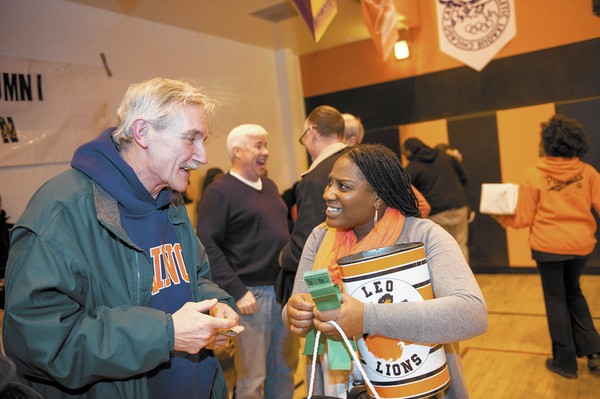As borrowed from chicagotribune.com

( Rob Hart, For the Chicago Tribune 1/30/2014 )
Chantilly Butcher, right, Class of 1998, sells raffle tickets to Mike McElherne, Class of 1972, during the annual alumni basketball game last month at Leo High School in Chicago.
Former graduates reach across economic divide to lend assist to today’s students
By Bonnie Miller Rubin, Tribune reporter
February 14, 2014
There is a lot of hand-wringing these days, in the media and elsewhere, about the state of America’s schools. Violence, tumbling graduation rates and funding crises dominate the headlines, flooding us with a daily drumbeat of negative impressions.
In Chicago, there are schools where few suburbanites would dare to tread — even though they once walked those hallways. It may seem easier to ignore what often appears to be an entrenched, unresolvable mess.
Yet an army of volunteers slogs on, in the form of high school alumni groups. Men and women are still involved in their alma maters, even as current student populations don’t mirror the memories.
Take Leo High School, an all-male Catholic school that was once predominantly Irish-American. By the 1970s, the McCarthys, Fitzgeralds and O’Briens moved away, replaced by African-American students. By the 1990s, the Christian Brothers — the order that founded the school — had ended its affiliation.
So, the alumni — sons of cops, firefighters and tradesmen — stepped outside of themselves and into someone else’s shoes. They may be a long way from 79th and Sangamon streets, but you wouldn’t know it the way they all seem to echo the same mantra: “The mission doesn’t change just because the demographics do.”
“It’s about opportunity,” said Bob Sheehy, class of 1971, who lives in Orland Park. “It’s about providing young men with a chance to move on.”
These “old white guys” make donations and also show up on career day and help spruce up the building on one Saturday every month, working alongside the parents of current Leo Lions. They cheer on the football and basketball teams and leverage relationships to create internships. At a recent get-together — the kind of evening that could easily have been steeped in beer-soaked nostalgia — they passed the hat for a family suffering a stretch of bad luck.
No recriminations, no lectures about saving for a rainy day. Just next semester’s tuition.
“You see these kids … and the sacrifices their parents are making for them to get a good education … and it just tugs at you,” Sheehy said. “It’s never about black and white. … It’s about what it means to be a ‘Leo man.'”
Seton Academy is another place where alumni are paying it forward. The South Holland institution faced a radical transformation — not just racially but in gender, too. The all-female, all-white Catholic enrollment is now coed, with a 100 percent minority population.
At first, the women pushed back, with some thinking it wasn’t their school anymore. But then they got on board.
Diane Gulyas, a 1974 graduate, traveled from Delaware to attend Seton’s 50th anniversary gala last year, where current Seton students served alumni.
As bonds formed among strangers, the DuPont executive was struck by the similarity of past and present narratives, she said.
“We were from blue-collar families; they are from blue-collar families. We were the first generation to go to college … and they hope to be the first generation of college-goers in their families, too. We got to know them, … and that inspired us to be more engaged.”
The aspirations weren’t all that remained unchanged. After a tour, Gulyas and her sisters — who all were active in drama club — noted the same light board from 40 years ago and promptly wrote a check.
“It’s really about giving young people the best possible start in life,” Gulyas said. “It’s about asking: How do we help them along?”
Public school alumni are also posing that question. In every corner of the Chicago area, long-ago graduates feel compelled to reach out, despite the distance — physically and psychologically — from their old neighborhoods.
Hal Dvorin could blithely go about his life in Palatine without ever venturing south of the Art Institute. But after a visit to Bowen High School, which celebrated its 100th birthday in 2011, he reconnected. In the 1970s, the South Side institution was battered by white flight, an increase in crime and the closing of four steel mills. Seemingly overnight, families fled the area, which never recovered.
Today’s enrollment has dwindled to about 425, but in its heyday, there were more than 4,000 students, mostly from Serbian, Croatian and Jewish families, also looking for a toehold in the middle class.
“We produced … a surprising number of Ph.D.s,” Dvorin, Class of 1957, said with more than a touch of Boilermaker pride. (Other graduates include drummer Gene Krupa and “Fugitive” director Andrew Davis.)
The committee that organized the centennial morphed into an alumni association, providing scholarships and other support. “Most of our board members … are just looking for a way to give back in appreciation of the education we received,” he said. “The question now is: Can we make Bowen relevant enough to save it?”
That Dvorin and his classmates — all in their 70s — care at all about Bowen’s fate is not just poignant but seemingly out of sync with these finger-wagging times. They are less concerned with people taking advantage of the system and more focused on removing barriers.
Quietly and deliberately, all these groups are mending our country’s frayed social fabric. At one time, their families all stood at the bottom of America’s escalator. The difference? They didn’t forget.
Copyright © 2014 Chicago Tribune Company, LLC
Speak Your Mind